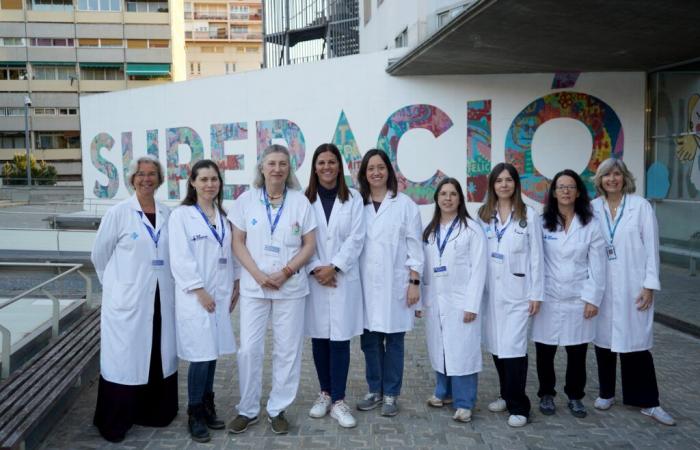A study led by the Obstetrics and Gynecology Service of the Vall d’Hebron University Hospital and the group of Maternal and Fetal Medicine of Vall d’Hebron Research Institute (VHIR) has shown that women who have suffered serious complications during pregnancy have a higher risk of developing cardiovascular diseases, such as stroke or heart attack, years after childbirth. The results, published in the magazine HealthcareThey show the importance of monitoring these women to improve long -term Health. The work has had the collaboration of the Group of Cardiovascular Diseases of VHIR, the Cardiology Service of the Vall d’Hebron Hospital, the Catalan Institute of Health, the La Paz University Hospital, the Jaume I University of Castellón and the Cardiovascular Diseases area of the CIBER (CIBERCV).
Research has first analyzed in the Spanish State the relationship between suffering complications in pregnancy and the risk of cardiovascular diseases, such as a heart attack or stroke, the years after delivery. Specifically, preeclampsia (related to high blood pressure during pregnancy), premature childbirth, gestational diabetes, abortions or birth of a lifeless baby was taken into account. “International Studies have previously explored this connection and it is essential to have specific data from our population to better adapt prevention and monitoring strategies”Highlights Dr. María Goya, attached to the Obstetrics and Gynecology Service of the Vall d’Hebron Hospital and principal researcher of the Vhir maternal and fetal medicine group.
The analysis is based on data from 10,734 women who gave birth at the Vall d’Hebron hospital between 2010 and 2015. Of them, 8,234 did not have complications during pregnancy, while 2,500 did suffer some. Subsequently, they were followed up for a period of between 6 and 11 years, depending on the moment of delivery, to know the appearance of cardiovascular diseases with the collaboration of primary care.
Women with pregnancy complications are twice as a risk of stroke or heart attacks
The results showed that women who had had some type of complication during pregnancy had a higher risk of having stroke or infarctions years after childbirth. These appeared, on average, six years after birth.
Specifically, women with complications have a 2.5 times higher risk than women without, although the figures were low: 12 of the 2,500 women with complications had a stroke or infarction, while 13 infarcts or strokes were produced among the 8,234 women who had no complications. Among the most outstanding data is to have a premature birth is related to a four times greater risk of having a stroke, and that suffering preeclampsia increases four times the risk of stroke or infarction.
In the case of women who had had more than one complication during pregnancy, the risk was even greater than if they had only had a complication. These people had eight times more risk of stroke or infarction than women without complications.
The research team adjusted the results taking into account other factors that could influence the risk of cardiovascular diseases, such as women’s age, the presence of obesity or smoking, to ensure that the results reflect the direct relationship between complications during pregnancy and subsequent risks.
“Pregnancy can help detect possible cardiovascular health problems that will appear later”remarks Dr. Marta Miserachs, first author of the work carried out in Vall d’Hebron and current attachment of Gynecology and Obstetrics of Mutua Terrassa. “It is an opportunity to track women who have had complications during pregnancy and apply measures to prevent cardiovascular diseases after childbirth, with the aim of reducing long -term risks”adds Cristina Martínez, responsible for the sexual and reproductive health care program of Barcelona City, of the Catalan Institute of Health (ICS).
From now on, “A specific postpartum monitoring circuit will be created for these women in Vall d’Hebron, in collaboration with primary care. In addition, those who wish to participate in a clinical trial that use more proactive interventions to reduce the cardiovascular risk of these women will be offered” in collaboration.explains Dr. Goya.
More research to understand the reason for this relationship
During pregnancy, the woman’s body needs to adapt to get energy and fetus. This is done through changes in metabolism, heart and blood vessels that, although necessary, can make base conditions and translate into pregnancy alterations. “Pregnancy is considered a stress test that reveals vulnerabilities in the woman’s cardiovascular system that until then could have gone unnoticed”Explains Dr. Antonia Pijuan, attached to the Cardiology Service of the Vall d’Hebron University Hospital and researcher at the Group of Cardiovascular Diseases of VHIR and CIBERCV.
The labor authors highlight the importance of continuing to investigate to understand the relationship between gestational and cardiovascular complications and why the infarctions and long -term stroke occur.






